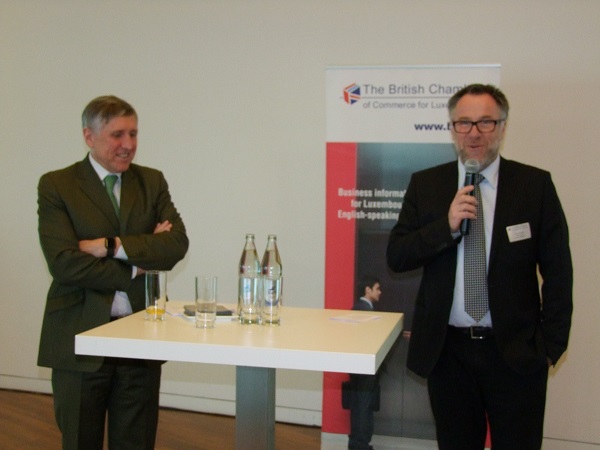 (L-R): Minister Francois Bausch; Daniel Eischen, BCC;
(L-R): Minister Francois Bausch; Daniel Eischen, BCC;
On Wednesday 30 January 2019, the British Chamber of Commerce (BCC) in Luxembourg held it first luncheon of the new year, at La Table du Belvedere in Luxembourg-Kirchberg, with government minister, Francois Bausch, as guest speaker on the topic of "Luxembourg - a small country punching above its weight - Why Luxembourg has more influence internationally than its size would suggest".
BCC's Vice-Chairman, Dan Eischen, welcomed the circa 80 members to the event and, in his introduction, mentioned about Brexit and said that members would have plenty of opportunities to address this issue in the weeks and months to come. He introduced Minister Bausch who, since the elections and the new government in office, has now the triple portfolio of Mobility and Public Works, of Internal Security, and of Defence.
Minister Bausch explained that today is a special day, following on from "an extraordinary day" yesterday in the British parliament; he acknowledged that when he accepted the invitation he was not to know the happenings of yesterday, in particular, in the British parliament when it voted to got back to the EU and re-negotiate the Withdrawal Agreement. He explained that he wanted to talk about the history of Luxembourg, it open-mindedness and its support of the European project.
Small Luxembourg has more influence internationally than its size suggests. Its history is based on its geographic location which has seen much geopolitical significance; Luxembourg lies on the border of Roman and Germanic languages, which the country has taken to its advantage. He also mentioned about the famous Fry and Laurie sketch on the Treaty of Westphalia...
Since the end of WWII, Luxembourg sees itself as "a mediator and honest broker", and has fewer interests to defend than larger countries - a situation which is useful in negotiations. Luxembourg has provided three Presidents of the European Commission (Gaston Thorn, Jacques Santer and Jean-Claude Juncker). Luxembourg has helped to build the post-war order; he then recounted a brief history of the EU. Luxembourg consistently leads opinion polls of satisfaction with the EU, etc., and hosts a number of the European Institutions.
Luxembourg has traditionally been dependent on its neighbours; nowadays, the relationship is more one of co-dependency. He descried the Greater Region as a "testing ground" for the EU, and referred to the remarkable statistics of cross-border workers (1% across the EU; 42% for Luxembourg). He stressed that cross-border commuters, rather than being a drain on the economy, are an asset.
He also mentioned that cross-border mobility services, many of which have been implemented, will continue over the next five years (during the lifetime of the government programme). Luxembourg stands for openness and immigration - the latter a particular opportunity for the country. Currently, non-nationals count for 49% of the country's population; this rises to 65% concerning Luxembourg city. He referred to Portugal and Italy which, historically, contributed early on to the internationalisation of Luxembourg. Multilingualism is one asset of which Luxembourg is particularly proud, but not to the detriment of Luxembourgish which it continues to promote.
Luxembourg is rapidly changing in this age of globalisation. With the steel industry being the economic backbone of the country, this has now been replaced by the financial sector. The government is planning a strategy of diversification to reduce the reliance on financial services and is looking to niche sectors in which to invest and specialise. SES was set up in 1985, with ICT, logistics, HealthTeach, audiovisual and other sectors will continue to grow, and niche sub-sectors of finance will continue to be explored - e.g. the Luxembourg Green (stock) Exchange.
He explained that an economy that creates 10,000+ jobs/year leads to many challenges, including transport and mobility. He referred to low occupancy levels of private cars (every 5th car has a second passenger). He stated that he is convinced that Luxembourg will develop a multi-mobility transport system for the region, encouraging alternatives especially around peak times.
At a political level, he also referred to the rise of populism in various countries across Europe and hopes that Luxembourg does not go down this route. He sees the need to diversify in various areas.
In response to questions from members, Minister Bausch talked about renewable / sustainable energy, electric cars and mobility strategies.








